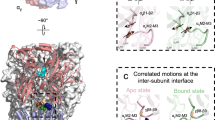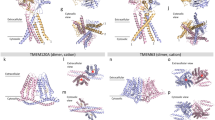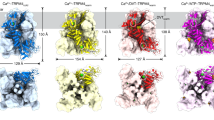Abstract
RECENT work has emphasised the important role which the state of the membrane has in the function of its transport and enzyme systems1,2. At various synapses the action of transmitter substances is accompanied by ‘membrane noise’ associated with the opening and closing of ionic channels. Analysis of this noise gives an estimate of the mean conductance and lifetime of the single open channel3–9. In locust muscle we have found that the mean lifetime (τ) of channels, activated either by the natural transmitter or by externally-applied glutamate, is prolonged as the temperature is lowered, while the conductance (γ) of the single channel is decreased. The dependence of γ and τ on temperature shows a change in slope at a temperature which itself depends on the membrane potential. These results are possibly due to a potential-dependent phase transition in the membrane around the channel causing an abrupt change in the operation of the gating molecule and conductance-determining portion of the channel.
This is a preview of subscription content, access via your institution
Access options
Subscribe to this journal
Receive 51 print issues and online access
$199.00 per year
only $3.90 per issue
Buy this article
- Purchase on SpringerLink
- Instant access to the full article PDF.
USD 39.95
Prices may be subject to local taxes which are calculated during checkout
Similar content being viewed by others
References
Chapman, D. Q. Rev. Biophys. 8, 185–235 (1975).
Wilson, G. & Fox, C. F. J. molec. Biol. 55, 49–60 (1971).
Katz, B. & Miledi, R. J. Physiol., Lond. 224, 665–699 (1972).
Anderson, C. R. & Stevens, C. F. J. Physiol., Lond. 235, 655–691 (1973).
Bevan, S. J., Katz, B. & Miledi, R. Proc. R. Soc. B191, 561–565 (1975).
Crawford, A. C. & McBurney, R. N. J. Physiol., Lond. 258, 205–226 (1976).
Anderson, C. R., Cull-Candy, S. G. & Miledi, R. Nature 261, 151–153 (1976).
Neher, E. & Sakmann, B. Nature 260, 799–802 (1976).
Lass, Y. & Fischbach, G. D. Nature 263, 150–151 (1976).
Hoyle, G. Proc. R. Soc. B143, 281–292 (1955).
Cull-Candy, S. G. J. Physiol., Lond. 255, 449–464 (1976).
Magleby, K. L. & Stevens, C. F. J. Physiol., Lond. 223, 173–197 (1972).
Levy, H. M., Sharon, N. & Koshland, D. E. Proc. natn. Acad. Sci. 45, 785–791 (1959).
Gage, P. W., McBurney, R. N. & Schneider, G. T. J. Physiol., Lond. 244, 409–429 (1975).
Dreyer, F., Müller, K. D., Peper, K. & Sterz, R. Pflügers Arch. ges. Physiol. 367, 115–122 (1976).
Author information
Authors and Affiliations
Rights and permissions
About this article
Cite this article
ANDERSON, C., CULL-CANDY, S. & MILEDI, R. Potential-dependent transition temperature of ionic channels induced by glutamate in locust muscle. Nature 268, 663–665 (1977). https://doi.org/10.1038/268663a0
Received:
Accepted:
Issue date:
DOI: https://doi.org/10.1038/268663a0
This article is cited by
-
Characterization of the mobile charges in the membrane ofValonia utricularis
The Journal of Membrane Biology (1985)
-
Effect of temperature on the occluding junctions of monolayers of epithelioid cells (MDCK)
The Journal of Membrane Biology (1984)
-
Glutamate activated postsynaptic channels in crayfish muscle investigated by noise analysis
Pfl�gers Archiv European Journal of Physiology (1983)
-
Effects of concanavalin A on glutamate operated postsynaptic channels in crayfish muscle
Pfl�gers Archiv European Journal of Physiology (1983)
-
Fast decay of fish synaptic currents
Experientia (1983)



